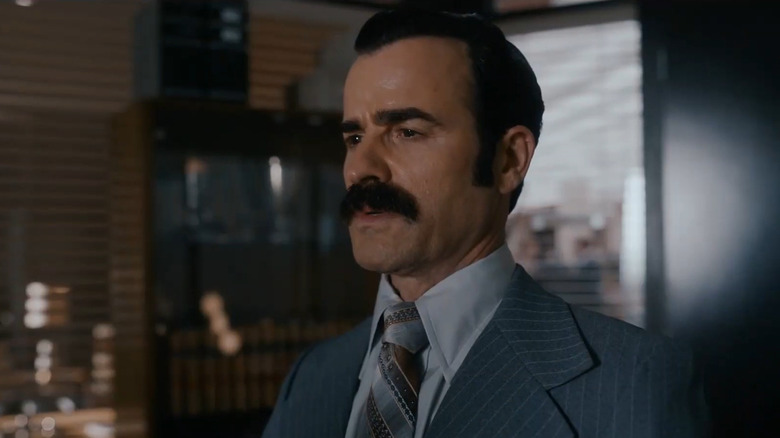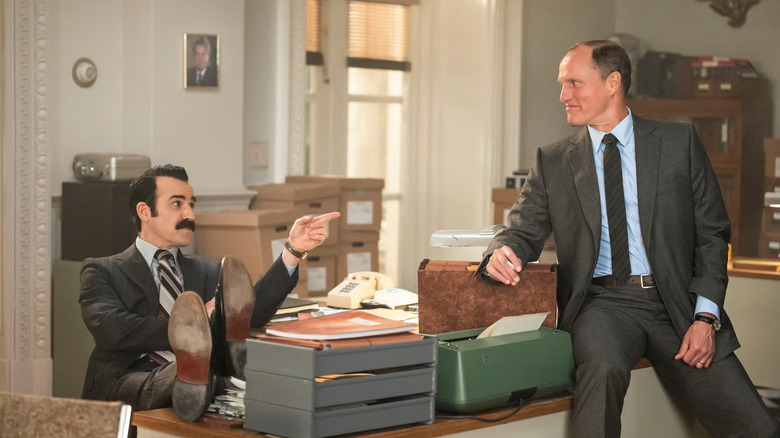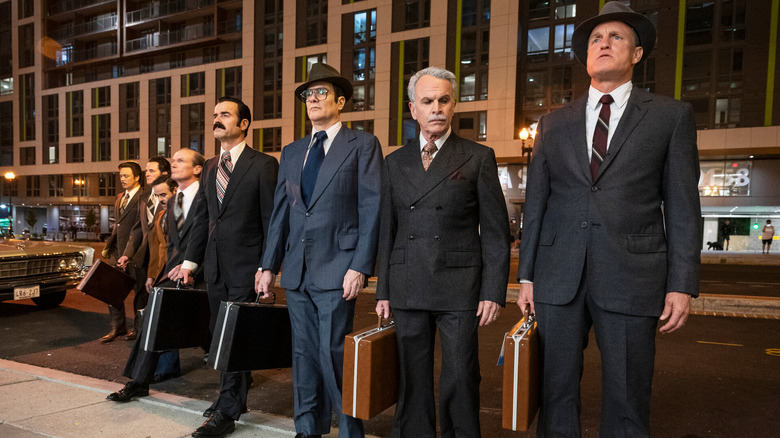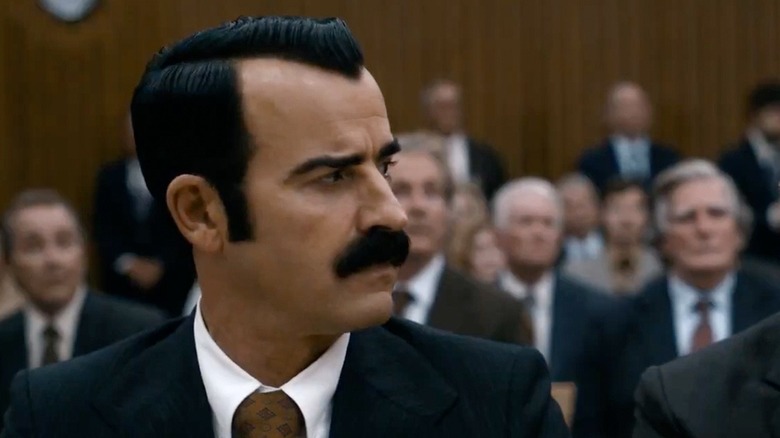
HBO's newest miniseries "White House Plumbers" introduces us to G. Gordon Liddy (Justin Theroux), a pretty strange guy. Before co-protagonist Howard Hunt meets him, he's told an anecdote about the man: "[Liddy] has a thing that he does to prove his commitment. He'll hold his hand in the flame of a candle… He gets third-degree burns every time. Never flinches."
Even mere first-degree burns are incredibly painful, so it's easy to see how this can be interpreted as a pretty badass move on Liddy's part. Talking about it in his 1976 autobiography "Will," Liddy even gave readers an example of how he used this technique to win the trust of a potential candidate for his and Hunt's escapades, a woman named Sherry Stevens:
"I told her to light her cigarette lighter and hold it out. She did and I locked my gaze upon her eyes and placed my hand, palm down, over the flame. Presently the flesh turned black and when she smelled the scent of burning meat, Sherry Stevens broke from my gaze and pulled the lighter away from my hand. She seemed frightened badly so I took pains to calm her, wrapping an ice cube against the burn with a napkin and returning to my dinner…"
This display allegedly resulted from years of burning his hand to build up a tolerance to fire. "I exposed my body to pain as I built up my will, much as one might build muscles by lifting increasingly heavy weights," he wrote. In a 1980 interview with Terry Gross, he attributed the burning exercise for his later ability to "resist all three branches of the federal government" during the Watergate trials. To Liddy, not flinching under extreme pressure was the true mark of an admirable man.
Okay, But What About The Hitler Stuff?

While the candle anecdote is certainly memorable, it is Liddy's decision to casually play Hitler's speeches at a dinner with his new coworker that's made the biggest impression overall. We understand the logic behind burning himself, questionable though it may be, but what's the reason for this?
Liddy explains in the pilot that although he is not a Nazi, he feels comforted by the bravado coming from Hitler's voice, because this is what he heard over the radio as a malnourished, mistreated child. "Hitler's sheer animal confidence and power of will [entranced me]," the real Liddy once said, a sentiment perfectly in line with the private conversation Theroux's Liddy has with Hunt in the miniseries' first episode. The real Liddy went even further, admitting, "at assemblies where the national anthem is played, I must suppress the urge to snap out my right arm."
Although Liddy has always insisted that he rejects everything Hitler stands for, "White House Plumbers" questions whether, had he been an adult living in Nazi Germany at the time, would he not have gotten in line? In his talk show he hosted after getting out of prison (which ran from '92 to 2012) Liddy was not only unrepentant of his crimes, but was consistently, unflinchingly reactionary. He compared environmentalists to Al Qaeda and was very comfortable with the idea of the government murdering journalists. When it comes to the war on drugs and the war in Vietnam, his chief critique of the American government was that it wasn't brutal enough.
But the Liddy introduced in the pilot isn't a full-on villain; much of his strange behavior seems to come from his obsession with strength, and his questionable idea of what strength even is.
Strength Or Self-Destruction?

This brings us back to the candle anecdote: the characters in the show treat it as an impressive display of Liddy's strength, but the show itself seems to think otherwise. Maybe giving yourself third-degree burns on the palm of your hand isn't a badass act after all, but a needless feat of self-mutilation that helps no one. Just as Liddy refused to pull his hand away from the fire even though every rational part of him wants him to do so, the real Liddy also refused to pull himself away from Nixon, despite all the damage done to himself and the world around him.
To his dying day, Liddy has never apologized for his role in the Watergate scandal and always insisted he did the right thing. "It certainly was permissible, as far as I'm concerned, for us to take what in other circumstances would have been extralegal means in order to restore order," he'd say, and he never really changed his tune. He always seemed to see himself as a noble hero who sacrificed himself for the heroic Richard Nixon. When asked how he wanted history to remember him in a 2004 profile, he answered, "I hope it says G. Gordon Liddy was strong… A strong man."
However, if this new miniseries has been any indication, Liddy did not get his wish. Of all the words to describe HBO's depiction of Liddy, "strong" is far from the first to come to mind. Most of this show's humor comes from depicting its two scheming leads as being as incompetent as possible, and that's where the most creative liberties are taken. Take, for instance, the scene with the Hispanic cleaning lady…
Undermining Liddy At Every Turn

In Garrett M. Graff's thorough account of the scandal, "Watergate: A New History," the scene where Hunt talks to the cleaning lady is described in general terms, giving off the impression of two charismatic con men swindling the cleaning lady to their will: "Speaking Spanish, Hunt explained that they were doctors and needed to leave a message for their colleague," Graff wrote. "She unlocked the door to Fielding's office, and Hunt distracted her as Liddy pretended to leave a note while surveying the suite layout and office door."
The show's version of events is still faithful to the official version, but the writers take advantage of the fact that the real-life cleaning lady has never told her side of the story. Here, the cleaning lady lets them into the room not necessarily because she believes them, but because she's too tired to bother making a fuss about it. They don't trick her; she just doesn't care.
So far, "White House Plumbers" has let the plot continue along with the real-life version of events, but it denies the real Liddy and Hunt the suave, calculated depictions they gave themselves. Liddy's whole understanding of himself seemed to have been of a strong, smart man who did what needed to be done for the good of the nation; at every turn, this show is insisting that he wasn't. In Liddy's case, not pulling his hand away from the fire is an act of cruel, stubborn delusion, a sign of his inability to change his mind or to consider other points of view properly. We don't know where the next four episodes of the miniseries will go, but the show's take on Liddy already seems clear: a strong man, this is not.
Read this next: The 15 Best Anthology TV Series Ranked
The post Did the Real Gordon Liddy from White House Plumbers Actually Burn Himself with Candles? appeared first on /Film.
